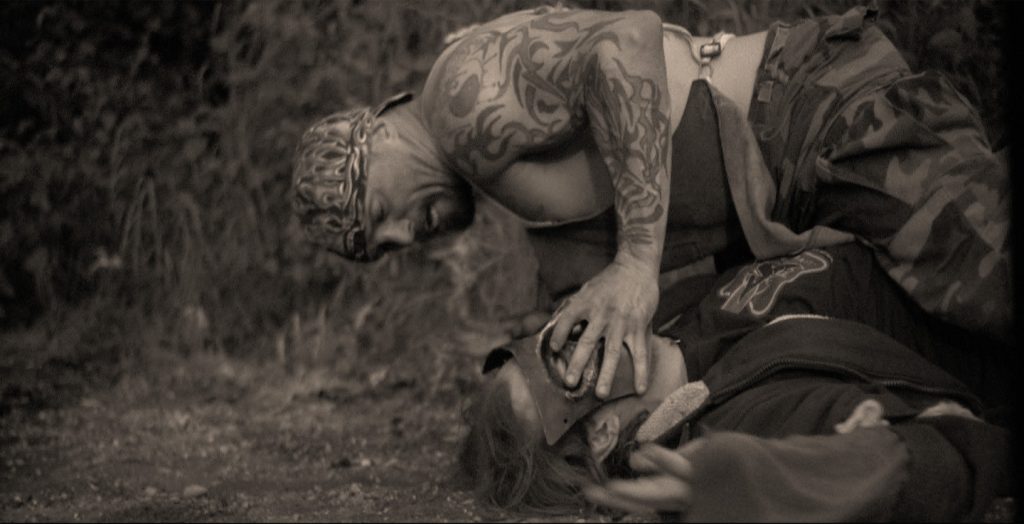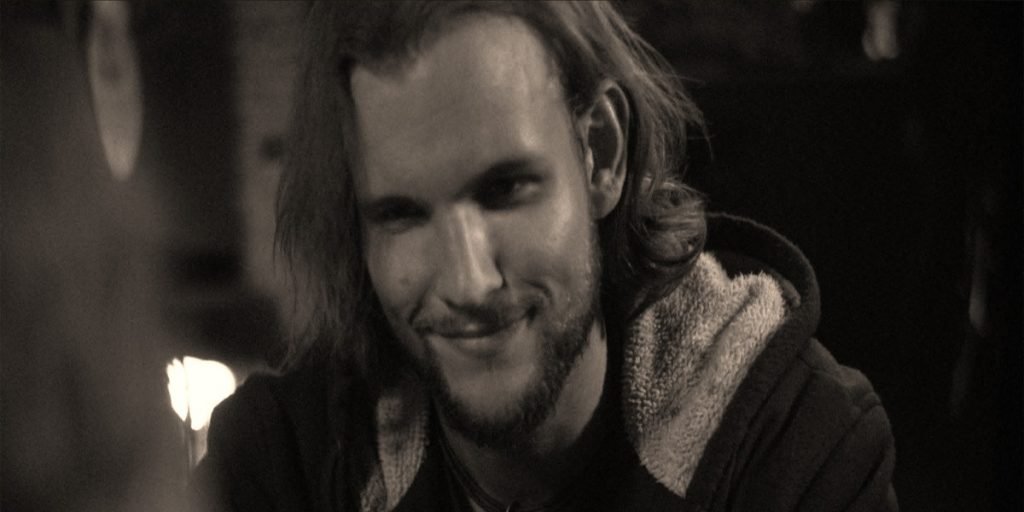With its black and white tone and grounded realism, Proper Binge is a rightfully uncomfortable descent into alcoholism.
Proper Binge opens with a blurry shot of a figure, someone else whistling in the background whilst the person in picture groans. Moments later, we see the bloody, beaten face of main character Buzz (the engaging Bradford James Jackson), as he looks around his surroundings, confused. It is a gritty opening that not only grabs your attention and sets the tone for the rest of the film, but also plants you right into the alcohol-addicted mindset of Buzz. Proper Binge does a lot right, most notably in its portrayal of the destructive effects of alcoholism on the person struggling with the addiction as well as on their friends and family; there are numerous moments poignancy and pain. It might lack a clear, forcefully driven narrative and add in moments of frustrating melodrama, but there’s still enough here to mark Dean Q. Mitchell and Michael Burns (Peaks and Valleys) out as directors unafraid to tackle heavy subjects in a realistic, effective way.
The downbeat beginning of Buzz waking up (seconds later, he discovers it’s in a police cell) is amplified by the use of black and white, a choice which on occasion feels like it’s there just to give a trendy, arthouse vibe to proceedings but does, for the most part, work in enhancing the apathetic, depressing mood. As Proper Binge progresses and finds happier moments in its story, the black and white tone can sometimes hold these feelings back, which doesn’t quite allow it to distinguish those lighter moments from the sadder scenes. It wants to show the beauty shining through in the darkness but is not always capable of achieving this. Buzz is thirty-two years old and an alcoholic, his erratic behaviour shown to us through flashback scenes leading up to his rude awakening in the police cell. He spends time with his similarly heavy-drinking friends (although maybe not to such a destructive extent as himself): Cliff (Cheyenne Buchanan), Steve (Jeremy Blake) and Jason (Berick Cook) before a car accident involving Buzz and Jeremy forces him to sit back and take stock of the path he is on.

Mitchell and Burns’ screenplay is a mix of engaging and realistic dialogue, memorable lines with emotional weight and melodramatic moments that jar with the film’s tone. The friendship between the four main characters is given a believability through the zippy dialogue between them, as well as thanks to the central performances, but there are also numerous homophobic slurs within the script. These insults are said by characters to friends and foes, and on each occasion are unsavoury and hugely unnecessary. Proper Binge also falls into overly sentimental trappings at certain points too, when the best decision would be to let the acting and emotions of the scene run free; instead, Mitchell and Burns are sometimes guilty of melodramatic lines which take this weight away and almost make you roll your eyes. A central message of Proper Binge is how alcoholism can not only cause people living with it to lose friends and family, but also to lose themselves and their identity. Here, the screenplay adds a genius strike with the introduction of Henrik (Thomas G. Jacobs), a homeless man living with alcoholism.
When Buzz asks Henrik who he has lost due to his addiction, Henrik can barely remember, but he perhaps most tragically laments the fact that he has lost himself. It’s a subtle, moving piece of writing, delivered brilliantly by the grounded Jacobs, that sticks with Buzz and the audience. It’s also a sign of where Proper Binge works best; not when the tones and themes are forced but when they are intelligently delivered and retaining their realism. The same can be said of Jackson’s central performance. For the most part, he is terrific in his tortured performance, always able to capture Buzz’s turmoil as well as the simmering intensity which so often threatens to explode from within. And when it does explode, inevitably, Jackson gives the audience a raw, believable energy. However, this sort of blow-up of emotion is a difficult path to navigate and Jackson can be guilty of, like other aspects of Proper Binge, leaning too heavily into the melodrama. It is frustrating, as so much of the film is effectively grounded in gritty realism, which makes the overly exaggerated moments that much more cloying.
Aside from Buzz and Henrik, other characters are given less depth, meaning some emotional connections are lost, but that matters less when Buzz is such a compelling, flawed protagonist. Proper Binge manages to strike an impressive balance between stark, difficult realism and happier moments of levity. Amidst the alcoholism, destruction, fighting, lies, and so on, these are still normal people trying to navigate life, as bumpy as it may be. Proper Binge loses sight of this at times but still manages to conclude on an impressive note of resolution, ensuring it is remembered as a resonant and realistic study of addiction.
Proper Binge is now available to watch on Prime Video.

